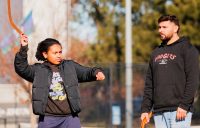
In partnership, Tennis ACT, local construction company Manteena, and the Ted Noffs Foundation deliver free cardio tennis sessions to socially disadvantaged and disconnected young people undergoing drug and alcohol rehabilitation, with tennis providing the physical activity component of the rehabilitation program.
Physical activity is the main benefit. But it also assists with individuals’ rehabilitation programs overall, when looking at communication, working with people individually and as a team and promoting a healthy lifestyle.
The Canberra Tennis Centre has been running the weekly, one hour program for two years, engaging with an average of 60 young people per year. Participants are both male and female, aged between 14 and 18 years.
Many Tennis ACT staff have been involved in the program, particularly Tennis World coach, Airlie Chalmers.
Teaching basic tennis fundamentals, Airlie tries to make it enjoyable, providing participants skills for life.
“I provide them with tennis skills that can be used for the rest of their lives,” she said. “Some have never played tennis before and other have never had an interest in the sport. But most leave the session feeling challenged, whilst having had some fun.”
If someone is really enthusiastic about tennis and they complete the full Ted Noffs program, then they get to keep their provided tennis racquet.
So far, one has been given out to a boy named Peter*. He was really stoked, and intended to return to his local tennis club to use the raquet, where he played when younger.
Another youth, 17-year-old Ben*, benefited significantly from the tennis program.
The first week he attended, he was coming down off the drug ice – so he didn’t play. But instead, walked around the tennis centre and did laps. The second week he was noticeably agitated, and stormed off court.
However from week three, coaching staff witnessed a significant change in his attitude. Each week, Ben spent longer on court. He used the time to take out his frustrations on the ball rather than others around him.
In his final week, he played for over 40 minutes. Post match, Ben stayed on the sidelines and talked openly about his life story.
He turned out to be a great kid, who hadn’t had the opportunities others may have had growing up. Like many, he had fallen in with the wrong crowd. He’s since moved back to the South Coast*, where he’s now employed as a labourer.
#tenniscares
*Names and locations have been changed to protect identities.




